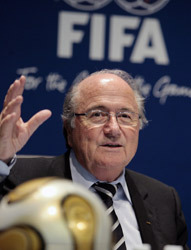 Save up to 33% on a subscription to World Soccer
Save up to 33% on a subscription to World Soccer
FIFA has pledged to forge closer ties with Interpol to deal with the growing threat posed by match-fixing.
FIFA president Sepp Blatter said that the world’s governing body would spend £20million on anti-corruption measures over the next 10 years to deal with the problem.
Blatter acknowledged that the credibility of the game and the support of the public would be fatally undermined if matches were fixed.
“If they cannot believe any longer (in) football because matches are fixed, then in such a case FIFA would lose all credibility,” he told reporters.
The project – funded by the biggest private donation ever received by Interpol – will operate from the international agency’s new base in Singapore.
Singapore has emerged in recent months as a link in match-fixing scandals, including international friendly matches set up purely for betting scams.
In one highly-publicised case in February, a double-header played in Turkey involving Latvia, Bolivia, Bulgaria and Estonia saw all seven goals scored from penalties. FIFA has charged six match officials from Hungary and Bosnia but the organiser from Singapore has yet to be found.
Blatter and Interpol secretary general Ronald Noble signed the agreement at FIFA headquarters after meeting detectives leading ongoing investigations in Finland and Germany.
“It is crucial for us to go together with political authorities and police authorities to fight those that want to destroy our game,” Blatter added.
Noble explained how online betting and match-fixing offered a “perfect mix” for international crime syndicates.
“It’s high profit, a low risk of getting caught, with very low penalties,” he said. “Just about every act that occurs in a match is the opportunity to make a huge amount of profit.”
Europe’s biggest-ever match-fixing investigation is currently being conducted by German police in Bochum who have investigated 300 people and 300 suspect games, including a World Cup qualifying match.
Bribes worth £1.7million have been paid to players, referees and officials but the sum is “just the tip of the iceberg”, said Freidhelm Althans, who is leading the investigation.
“We have indeed seen there is a worldwide network of people active in this field.”
Finland became the focus in February when police arrested a second Singaporean businessman linked to match-fixing claims in the Finnish league and Asia.
Noble said increased media reporting of suspicious matches had prompted Fifa and Interpol to act.
“We needed to do something to make sure the public realises that this is a problem that’s long term,” added the Interpol boss. “It’s a problem that’s going to require law enforcement to train those groups most likely to be targeted.”





